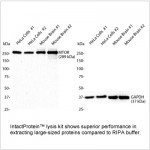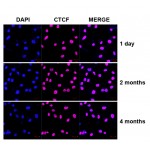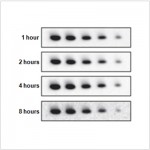Anti-Corticotropin Releasing Factor Rabbit pAb (100 μl)
| Reactivity: | H,M,R |
| Applications: | WB |
| Host Species: | Rabbit |
| Clonality: | Polyclonal |
| Full Name: | Corticotropin Releasing Factor rabbit polyclonal antibody |
Gene Name: | Corticoliberin |
Synonyms: | Crh, CRH, CRF, CRH1, corticotropin releasing hormone, Corticotropin Releasing Factor |
Immunogen: | KLH conjugated Synthetic peptide corresponding to Mouse Corticotropin Releasing Factor |
Isotype: | IgG |
Purity: | Affinity purification |
Predicted MW. | 21 kDa |
Observed MW. | 26 kDa |
Uniprot ID: | P06850, Q8CIT0, P01143 |
Product Usage Information
Applications | Species | Dilution | Positive tissue |
WB | Human, Mouse, Rat | 1: 500-1: 1000 | brain, hippocampus cerebral cortex |
Background
Corticotropin-releasing hormone (CRH) (also known as corticotropin-releasing factor (CRF) or corticoliberin; corticotropin may also be spelled corticotrophin) is a peptide hormone involved in the stress response. It is a releasing hormone that belongs to corticotropin-releasing factor family. Its main function is the stimulation of the pituitary synthesis of ACTH, as part of the HPA Axis. CRH is secreted by the paraventricular nucleus (PVN) of the hypothalamus in response to stress. Increased CRH production has been observed to be associated with Alzheimer's disease and major depression, and autosomal recessive hypothalamic corticotropin deficiency has multiple and potentially fatal metabolic consequences including hypoglycemia.
Images
 |
Western blot analysis of corticoliber (GB11706) at dilution of 1: 500 |
Storage
| Storage | Store at -20°C for one year. Avoid repeated freeze/ thaw cycles. |
| Storage Buffer | PBS with 0.02% sodium azide, 100 μg/ml BSA and 50% glycerol. |



